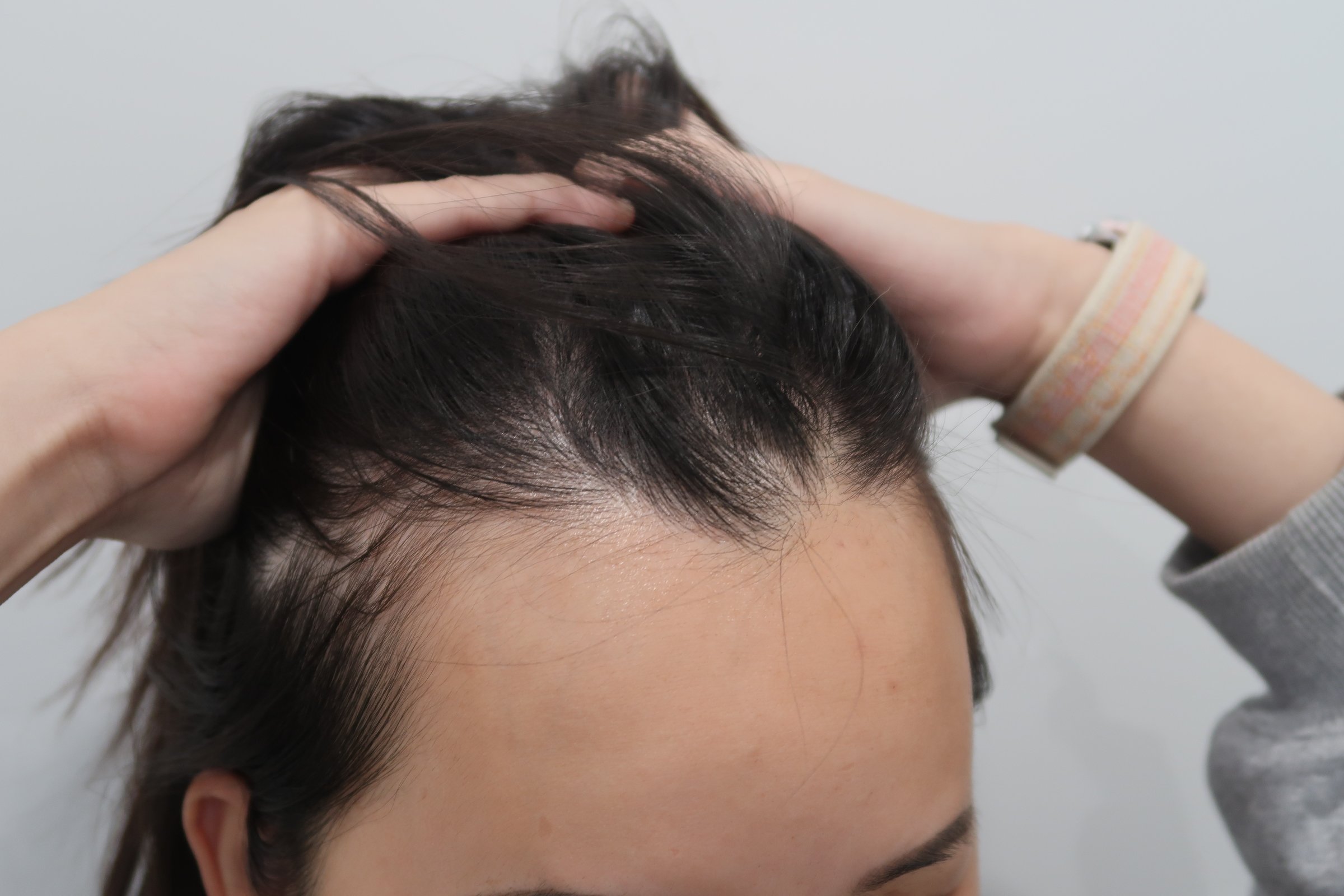
PCOS Related Hair Loss
Polycystic ovary syndrome (PCOS) can lead to hair loss through hormonal imbalances, particularly elevated levels of androgens like testosterone.
These androgens can disrupt the hair growth cycle, causing hair follicles to shrink and produce thinner, shorter hair. Additionally, high levels of insulin associated with PCOS can also contribute to hair loss by further increasing androgen production.
Platelet-Rich Plasma (PRP) therapy and Polydioxanone (PDO) thread treatments offer promising solutions for managing hair loss in individuals with Polycystic Ovary Syndrome (PCOS). PRP therapy involves extracting a small amount of the patient’s blood, centrifuging it to concentrate the platelets, and then injecting the platelet-rich plasma into the scalp. These platelets contain growth factors that stimulate hair follicle activity, promote hair growth, and improve hair density.
For individuals with PCOS-related hair loss, PRP therapy can be particularly effective due to its ability to address the underlying hormonal imbalances and promote healthy hair growth. The growth factors in PRP help to counteract the effects of elevated androgens, such as testosterone, which can disrupt the hair growth cycle in PCOS patients.
PRP Treatment
20 year old with PCOS. Initial Photos and after 6 treatments of PRP.
57 year old with PCOS. Initial Photos and after 2 of 6 PRP treatments.
In addition to PRP therapy, PDO thread treatments offer another innovative approach to treating PCOS-related hair loss. PDO threads are dissolvable sutures made from a biocompatible material that is commonly used in cosmetic procedures. When strategically placed beneath the scalp, PDO threads provide support to weakened hair follicles and stimulate collagen production, resulting in firmer, healthier skin and improved hair growth.
PDO Treatment
Combining PRP therapy with PDO thread treatments can yield synergistic benefits for individuals with PCOS-related hair loss. PRP therapy addresses the hormonal imbalances that contribute to hair loss, while PDO threads provide structural support to the scalp and promote collagen production, creating an optimal environment for hair follicle regeneration and growth.
Moreover, both PRP therapy and PDO thread treatments are minimally invasive procedures with relatively low risk and minimal downtime, making them suitable options for individuals with PCOS who may be hesitant to undergo more invasive surgical interventions.
Overall, the combination of PRP therapy and PDO thread treatments offers a therapeutic approach to managing hair loss in individuals with PCOS. By addressing both the hormonal imbalances and structural deficiencies associated with PCOS-related hair loss, these treatments can help restore hair density, thickness, and overall scalp health, improving the confidence and quality of life for affected individuals.
Combination Treatment
Nanoxidil Spectra CSF
Water-Based Formula (non-greasy) . Advanced Nanosome Delivery System®
This can be a successful option for women who suffer from hair loss from PCOS, for best results use with PRP Hair Treatments
1. "Androgenetic Alopecia in Women with Polycystic Ovary Syndrome: A Review" by International Journal of Dermatology (2011).
2. "Prevalence of Androgenetic Alopecia in Women with Polycystic Ovary Syndrome" by Journal of Dermatology (2012).
3. "Spironolactone in the Treatment of Hair Loss in Women with Polycystic Ovary Syndrome" by Journal of the American Academy of Dermatology (2014).
4. "Minoxidil for the Treatment of Androgenetic Alopecia in Women with Polycystic Ovary Syndrome" by Journal of Clinical and Aesthetic Dermatology (2016).
5. "The Role of Insulin Resistance in Hair Loss in Women with Polycystic Ovary Syndrome" by European Journal of Dermatology (2015).
6. "The Impact of Anti-Androgen Therapy in Women with PCOS and Androgenetic Alopecia" by Journal of the American Academy of Dermatology (2018).
7. "The Use of Oral Contraceptives in Women with Polycystic Ovary Syndrome and Hair Loss" by Obstetrics & Gynecology (2017).
8. "The Effect of Weight Loss on Hair Growth in Women with PCOS" by Journal of Clinical Endocrinology & Metabolism (2016).
9. "The Role of Genetic Factors in Androgenetic Alopecia in PCOS" by Journal of Investigative Dermatology (2019).
10. "Comparison of Finasteride and Spironolactone in the Treatment of Female Pattern Hair Loss Due to Polycystic Ovary Syndrome" by Dermatologic Therapy (2020).



